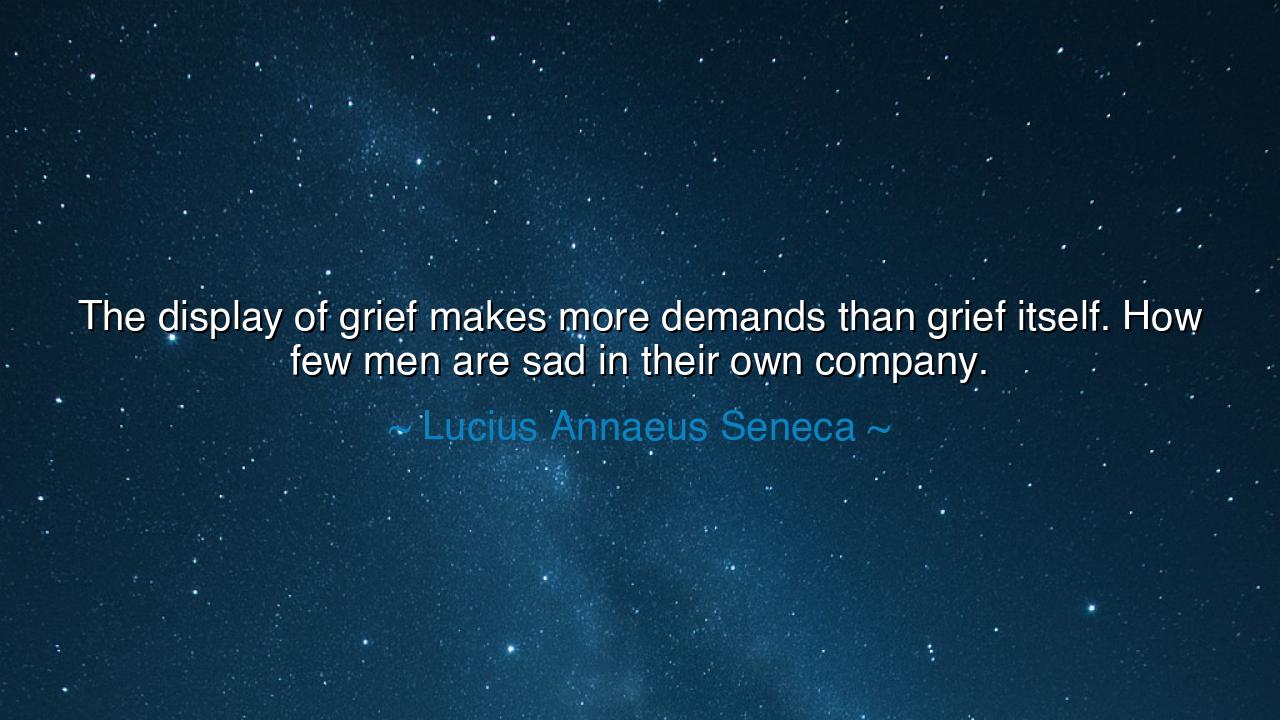
The display of grief makes more demands than grief itself. How
The display of grief makes more demands than grief itself. How few men are sad in their own company.






In the solemn words of Lucius Annaeus Seneca, the Stoic sage, we encounter one of the most piercing observations of human nature: “The display of grief makes more demands than grief itself. How few men are sad in their own company.” These words carry the weight of centuries, revealing the eternal conflict between what is felt within and what is shown without. Seneca, master of reason and restraint, teaches us here that much of what passes for emotion in the world is not born of the heart but of performance—grief worn as a mask, sorrow turned into spectacle. He reminds us that true sadness is quiet, intimate, and often unseen.
In the age of Rome, when power was displayed through grandeur and sorrow was paraded as virtue, Seneca saw the emptiness behind these gestures. As a philosopher of the Stoic school, he believed that strength lay not in outward display but in inward mastery. To him, the act of displaying grief—public wailing, theatrical mourning, elaborate lamentations—was more exhausting than grief itself, for it demanded performance, not truth. And he saw how rare it was for a man to sit alone with his sorrow, to confront it without audience or adornment. His lament—“How few men are sad in their own company”—is not reproach alone; it is sorrow for the loss of sincerity in a world enamored by appearances.
The truth of his words lives on through the ages. Consider Queen Victoria, whose mourning for Prince Albert became the symbol of an empire’s grief. For forty years she dressed in black, her sorrow displayed in every portrait and decree. Yet historians have written that the truest moments of her grief were those unseen—her nightly prayers, her whispered remembrances, her letters written by candlelight. It was there, in solitude, that her sorrow became real. The display of mourning served the world; the feeling of mourning served the soul. Thus we learn that the quiet grief of one’s own company is more sacred, more cleansing, than the most dramatic lament before others.
Seneca’s words also unveil a subtler wisdom: that we often fear our own emotions and seek refuge in performance. To cry before others is easier than to sit in silence with one’s pain. To proclaim one’s sadness is easier than to accept it. Yet the philosopher warns that by turning grief into spectacle, we rob it of its purpose—to teach endurance, humility, and acceptance of life’s impermanence. The Stoics believed that grief, like fire, could consume or purify depending on how it was tended. When we face it honestly, alone, it purifies the heart. When we perform it for others, it burns away meaning and leaves only ashes of vanity.
From Seneca’s insight arises a great lesson for all who live in this modern age of masks and mirrors. We, too, live in a time when feelings are displayed for applause, when sorrow is measured by its visibility, and pain is adorned for sympathy. Yet the ancient wisdom still stands: what is authentic need not be announced. When you are sorrowful, do not rush to prove it; let it dwell within you, teaching you gently, until it softens into strength. To sit quietly with one’s grief is not weakness—it is the highest act of courage.
Let each who hears these words remember: the soul’s truest healing comes not through display but through stillness. When loss comes, or failure, or loneliness, turn inward. Do not flee from your sadness, nor seek validation from the crowd. Instead, sit beside your sorrow as you would beside a dying fire—feed it with understanding until it grows dim and quiet. Then, from its embers, wisdom will arise.
So, as Seneca taught in his time and as truth teaches still: beware the demand of appearances. The heart needs no witness to be sincere. The greatest grief, like the greatest love, is silent. To live with authenticity, we must learn to feel deeply in private, to think clearly in solitude, and to walk in the world not as performers of emotion, but as masters of it. For it is only when a person can be sad in their own company that they can also be joyful in their own truth.






AAdministratorAdministrator
Welcome, honored guests. Please leave a comment, we will respond soon